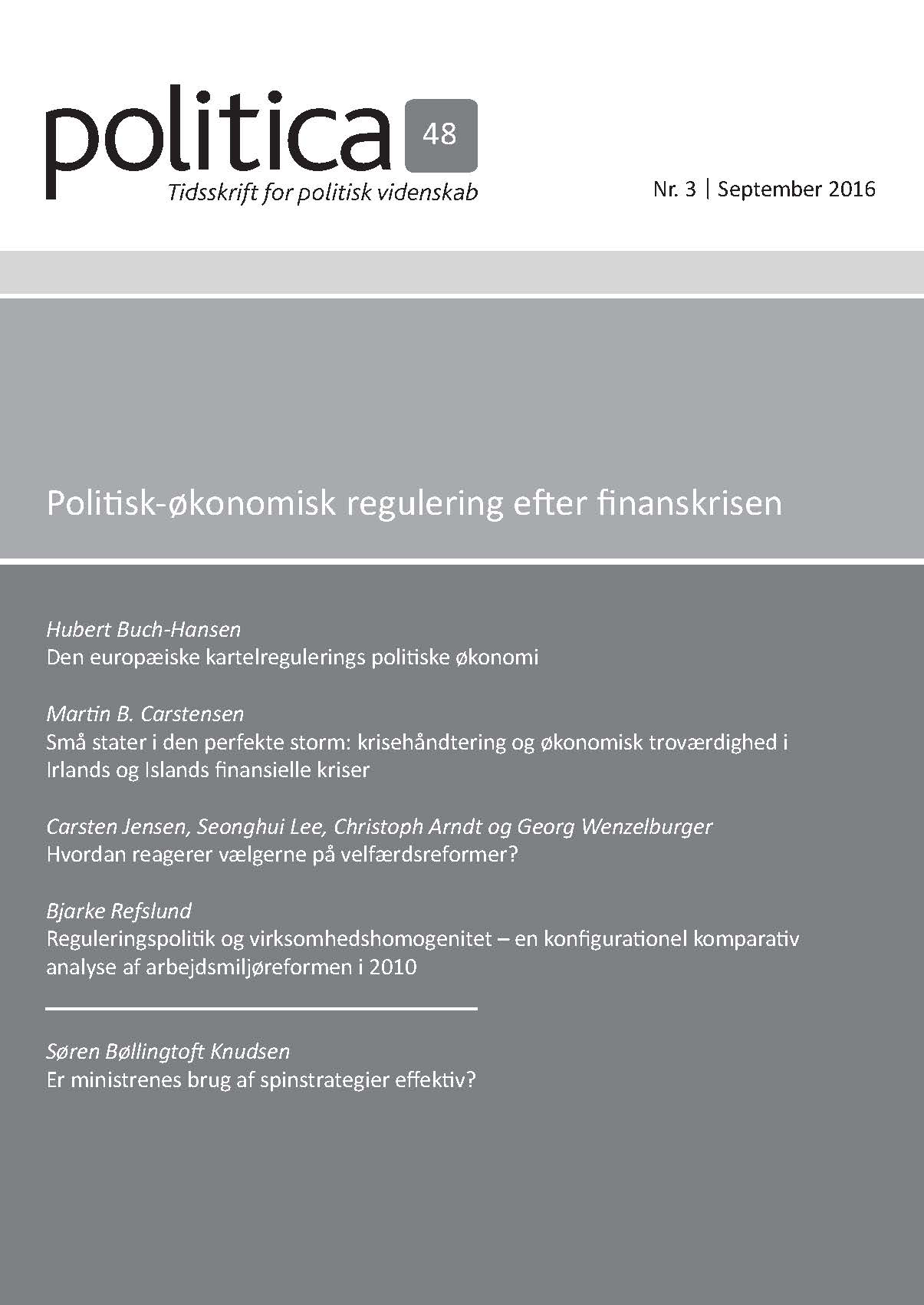Er ministrenes brug af spinstrategier effektiv?
DOI:
https://doi.org/10.7146/politica.v48i3.131397Resumé
Hvis en regering ønsker genvalg, er det afgørende, at dens ministre forstår det politiske spil. En central del af dette spil er spillet om skyldsunddragelse. Her kan ministre benytte forskellige spinstrategier. Spørgsmålet er, hvilke spinstrategier ministrene anvender, samt hvor effektive strategierne er. Dette undersøges ved at sammenligne seks danske ministres anvendelse af spinstrategier baseret på indholdskodning af 1412 artikler fra Politiken. Analyserne viser, at trods ændringer i hvilke strategier ministrene benytter, er anvendelsen af spinstrategier ikke øget de seneste tyve år. Mest effektiv er anvendelsen af én spinstrategi, næstmest effektivt er passivitet, og værst er det at kombinere flere spinstrategier. Endelig er hurtig respons hverken mere eller mindre effektiv end langsom.
Referencer
Austin, John (1956-57). A plea for excuses. Proceedings of the Aristotelian Society, 1956-57. http://www.ditext.com/austin/plea.html (2. november, 2013).
Binderkrantz, Anne Skorkjær, Jørgen Grønnegård Christensen, Peter Munk Christiansen, Erik Damgaard, Jørgen Elklit og Henrik Jensen (2009). Det demokratisk system – Valg, Folketinget, forvaltning og organisationer, 2. udg. Aarhus: Publizon A/S.
Bobocel, D. Ramona og Aaron C. Farrell (1996). Sex-based promotion decision and interactional fairness: investigating the influence of managerial accounts. Journal of Applied Psychology 81 (1): 22-35.
Christiansen, Peter M. og Hilmar Rommetvedt (1999). From corporatism to lobbyism? Parliaments, executives, and organized interests in Denmark and Norway. Scandinavian Political Studies 22: 195-220.
Conlon, Donald E. og Noel M. Murray (1996). Customer perceptions of corporate responses to product complains: the role of explanations. The Academy of Management Journal 39 (4): 1040-1056.
Cook, Timothy E. (2005). Governing with the News. Chicago: University of Chicago Press.
Dansk Oplagskontrol (2013). Kontrollerede oplagstal – Dansk Oplagskontrol. http://www.do.dk/asp/kontrolleredeoplagstal.asp (25. oktober, 2013).
DeSantis, Cari (2006). Media strategies for CEOs. Policy & Practice 64 (2): 14-16.
Fischer, Jörn (2012). “… I take political responsibility!”: The theoretical and empirical relation between ministerial responsibility and ministerial resignations in Germany. Public Administration 90 (3): 600-621.
Giger, Nathalie og Moira Nelson (2011). The electoral consequences of welfare state retrenchment: blame avoidance or credit claiming in the area of permanent austerity. European Journal of Political Research 50 (1): 1-23.
Gilens, Martin og Naomi Murakawa (2002). Elite cues and political decision-making, i Michael X.D. Carpini, Leonie Huddy og Robert Y. Shapiro (red.), Research in micropolitics: political decision-making, deliberation and participation. Greenwich: JAJ Press.
Henry, Craig (2007). Strategy in the media. Strategy & Leadership 35 (4): 52-59.
Hood, Christopher (2007). What happens when transparency meets blame-avoidance? Public Management Review 9 (2): 191-210.
Hood, Christopher (2011). The Blame Game: Spin, Bureaucracy, and Self-preservation in Government. Princeton: Princeton University Press.
Hvilsom, Frank (2013). Rockerborge går fri af bandepakke. Politiken, 30. oktober.
Kahneman, Daniel og Amos Tversky (1997). Prospect theory: an analysis of decisions under risk. Econometria 47: 263-291.
Lindhardt, Christian (2000). Aktion mod gensplejset mad. Politiken, 3. august.
Mazzoleni, Gianpietro og Winfried Schulz (1999). “Mediatization” of politics: a challenge for democracy? Political Communication 16: 247–261.
McGraw, Kathleen M. (1990). Avoiding blame: an experimental investigation of political excuses and justifications. British Journal of Political Science 20 (1): 119-131.
McGraw, Kathleen M. (1991). Managing blame: an experimental test of the effects of political accounts. The American Political Science Review 85 (4): 1133-1157.
Mortensen, Peter B. (2012). “It’s the central government’s fault”: elected regional official’s use of blame-shifting rhetoric. Governance: An International Journal of Policy, Administration, and Institutions 25 (3): 439-461.
Mortensen, Peter B. (2013a). (De-)Centralisation and attribution of blame and credit. Local Government Studies 39 (2): 163-181.
Mortensen, Peter B. (2013b). Public sector reform and blame avoidance effects. Journal of Public Policy 33 (2): 229-253.
Moynihan, Donald P. (2012). Extra-network organizational reputation and blame avoidance in networks: the Hurricane Katrina example. Governance: An International Journal of Policy, Administration, and Institutions 25 (4): 567-588.
Pedersen, Michael R. (1998). De ældre lades i stikken. Politiken, 25. august.
Pierson, Paul (1996). The new politics of the welfare state. World Politics 48 (2): 143-179.
Poulsen, Peter C. (1994). Minister beklager langstrakt voldssag. Politiken, 14. august.
Rigsrevisionen (2009). Beretning til Statsrevisorerne om brugen af særlige rådgivere. Rigsrevisionen, Folketinget.
Rothenborg, Michael (2013). Strandtudse kan stoppe Nordeuropas største skydebane, Politiken, 31. marts.
Shaw, Jerry I. og James A. McMartin (1977). Personal and situational determinants of attribution of responsibility for an accident. Human Relations 30 (1): 95-107.
Slothuus, Rune (2010). When can political parties lead public opinion? Evidence from a natural experiment. Political Communication 27 (2): 158-177.
Stark, Alastair (2011). The tradition of ministerial responsibility and its role in the bureaucratic management of crises. Public Administration 89 (3): 1148-1163.
Strömbäck, Jesper (2008). Four phases of mediatization: an analysis of the mediatization of politics. International Journal of Press Politics 13 (3): 228-246.
Sulitzeanu-Kenan, Raanan (2010). Reflections in the shadow of blame: When do politicians appoint commissions of inquiry? British Journal of Political Science 40 (3): 613-634.
Thesen, Gunnar (2013). When good news is scarce and bad news is good: government responsibilities and opposition possibilities in political agenda-setting. European Journal of Political Research 52: 364-389.
Togeby, Lise, Jørgen Goul Andersen, Peter Munk Christiansen, Torben Beck Jørgensen og Signild Vallgårda (2003). Magt og demokrati i Danmark – Hovedresultater fra magtudredningen. Aarhus: Aarhus Universitetsforlag.
Twight, Charlotte (1991). From claiming credit to avoiding blame: the evolution of congressional strategy for asbestos management. Journal of Public Policy 11 (2): 153-186.
Weaver, Kent R. (1986). The politics of blame avoidance. Journal of Public Policy 6 (4): 371-398.
Wiese, Anna Sophie (2011). Danske politikeres brug af blame-avoidance strategier i praksis. Upubliceret speciale, Institut for Statskundskab, Aarhus Universitet.
Wolfsfeld, Gadi (2011). Making Sense of Media & Politics: Five Principles in Political Communication. New York: Taylor & Francis.
Downloads
Publiceret
Citation/Eksport
Nummer
Sektion
Licens
LicensOphavsretten tilhører Politica. Materialet må ikke bruges eller distribueres i kommercielt øjemed.





